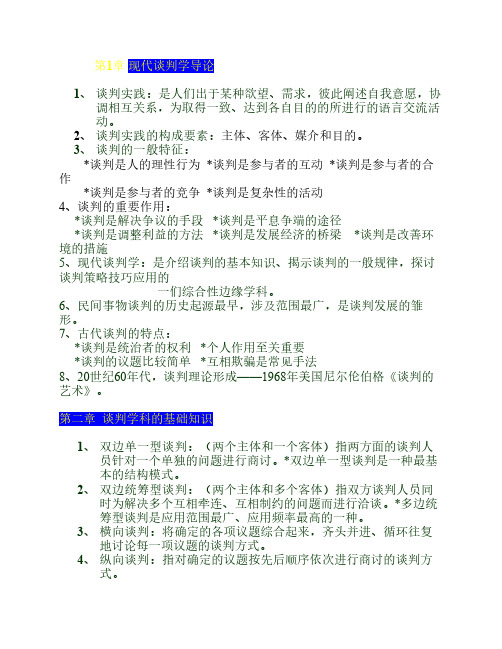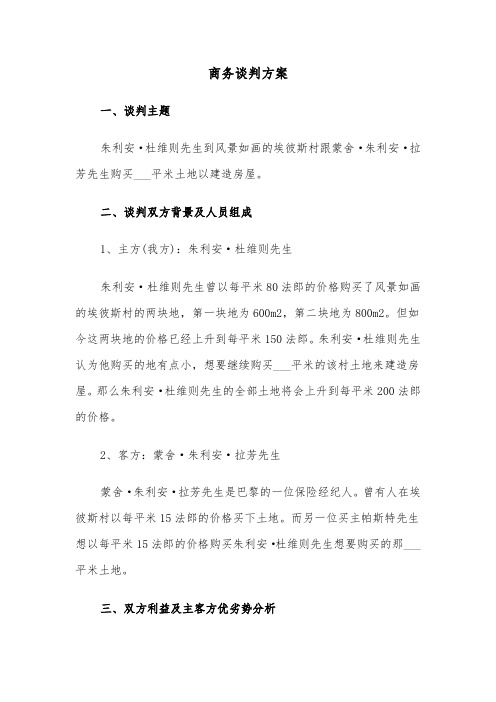第六章 谈判介绍
商务谈判各章要点

各章要点第一章谈判概述1、谈判:广义——包括非正式场合的协商、交涉、磋商和商量。
狭义——在正式场合当事人为满足各自需要和维持各自利益而进行协商的过程。
2、谈判的内容:(1)谈判是建立在人们需要的基础上的。
(2)谈判是两方以上的交际活动。
(3)谈判是寻求建立或改善人们的社会关系。
(4)谈判是一种协调行为的过程。
(5)选择恰当的谈判时间、地点。
3、谈判是市场经济发展的产物(1)现代经济社会离不开谈判。
(2)谈判是企业之间联系的纽带。
(3)谈判是开展国际贸易的重要手段。
4、谈判的代表性理论:(1)博弈论(博弈论上的谈判程序:一是建立风险值、二是确定合作剩余、三是达成分享剩余价值。
)(2)“黑箱”理论与谈判(黑箱——所不知的区域或系统;白箱——全知的系统或区域;灰箱——介于黑箱和白箱之间的区域或系统或部分可察黑箱。
)5、谈判的基本原则(1)合作互利原则:一、从满足双方的实际利益出发,发展长期的贸易关系,创造更多的合作机会;二、坚持诚挚坦率的态度;三、实事求是。
(2)避免在立场上磋商问题:一、立场上的讨价还价违背了谈判的基本原则,它无法达成一个明智、有效而又友好的协议;二、立场上的讨价还价会破坏谈判的和谐气氛,使谈判成为一场意志的较量;三、立场上的讨价还价还会导致产生不明智的协议;四、立场上的讨价还价还会严重地阻碍谈判协议的达成。
(3)提出互利选择:一、打破传统的分配模式,提出新的选择;二、寻找共同利益,增加合作的可能性。
(4)区分人与问题:一、当提出方案和建议时,也要从对方的立场出发考虑提议的可能性,理解或谅解对方的观点、看法;二、尽量多阐述客观情况,避免责备对方;三、使双方都参与提议与协商,利害攸关;四、保全面子,不伤感情。
第二章商务谈判概述1、商务谈判:买卖双方为了促成交易而进行的活动,或是为了解决买卖双方的争端,并取得各自的经济利益的一种方法和手段。
2、商务谈判的主体:参与谈判的当事人。
3、商务谈判的客体:进入谈判主体活动领域的人和议题(人是第一客体,议题是第二客体)。
6月25号现代谈判学总复习

第1章现代谈判学导论1、谈判实践:是人们出于某种欲望、需求,彼此阐述自我意愿,协调相互关系,为取得一致、达到各自目的的所进行的语言交流活动。
2、谈判实践的构成要素:主体、客体、媒介和目的。
3、谈判的一般特征:*谈判是人的理性行为 *谈判是参与者的互动 *谈判是参与者的合作*谈判是参与者的竞争 *谈判是复杂性的活动4、谈判的重要作用:*谈判是解决争议的手段 *谈判是平息争端的途径*谈判是调整利益的方法 *谈判是发展经济的桥梁 *谈判是改善环境的措施5、现代谈判学:是介绍谈判的基本知识、揭示谈判的一般规律,探讨谈判策略技巧应用的一们综合性边缘学科。
6、民间事物谈判的历史起源最早,涉及范围最广,是谈判发展的雏形。
7、古代谈判的特点:*谈判是统治者的权利 *个人作用至关重要*谈判的议题比较简单 *互相欺骗是常见手法8、20世纪60年代,谈判理论形成——1968年美国尼尔伦伯格《谈判的艺术》。
第二章谈判学科的基础知识1、双边单一型谈判:(两个主体和一个客体)指两方面的谈判人员针对一个单独的问题进行商讨。
*双边单一型谈判是一种最基本的结构模式。
2、双边统筹型谈判:(两个主体和多个客体)指双方谈判人员同时为解决多个互相牵连、互相制约的问题而进行洽谈。
*多边统筹型谈判是应用范围最广、应用频率最高的一种。
3、横向谈判:将确定的各项议题综合起来,齐头并进、循环往复地讨论每一项议题的谈判方式。
4、纵向谈判:指对确定的议题按先后顺序依次进行商讨的谈判方式。
5、从属式谈判:指针对单方主体提出的议题而展开讨论的谈判方式。
*多用于索赔。
6、独立式谈判:指针对双方主体各自提出的议题而展开讨论的谈判方式。
*多用于价格。
7、原则谈判法也叫事实谈判法。
*也叫哈佛谈判术。
8、哈佛谈判术四个基本特点?区别——区别人与事,对事实强硬,对人要温和*强调谈判中需要将人与事区别对待,原则式谈判主张将人与事实分开、单独处理,参与谈判的人将对方视为并肩合作的同事,只争论事实问题,而不攻击对方,这将有助于谈判的进展。
推销与商务谈判PPT课件第六章.商务谈判概述

第三节 商务谈判的基本理论
一、需要层次理论 马斯洛需求层次理论 1.生理需要:吃饭、喝水、休息 2.安全需要:高风险、高利润 3.社交需要:改善人际关系 4.尊重需要:尊重对手,就是尊重自己 5.自我实现需要:充分发挥自己的能力
二、博弈论 博弈论是研究不同主体之间相互影响行为的一种 行为的学问,是研究决策主体之间发生直接相互作用 时的决策以及这种决策的均衡问题。 (一)合作的必要性 1.每个人都是自私的 2.没有权威干预个人决策 合作要研究的问题: 1.人为何要合作;2.人什么时候是合作的,什么时候 不是合作的;3.如何使别人与自己合作
缺点: (1)通过观察对方表情可能会增加双方谈判的难度 (2)决策时间短,没有更充分的时间进行必要的研 讨 (3)费用相对较高
2.间接谈判 指双方不直接见面,而是谈判当事人通过信函、 电话、电传、网络等媒介进行商谈,或委托第三方进 行谈判。适用于比较规范、内容比较简单,双方比较 熟悉了解的基础上。 优点: (1)简单、成本低、快捷 (2)便于有效保护双方商业秘密 (3)减少双方从表情上分析彼此意图的机会
6.谈判具有一定的严密性和准确性 双方谈判的结果是最终以文字的形式来体现一种 证,通常是合作协议或合同。以合同的形式来约束 和规范双方的权利和义务。因此合同中的条款一定要 清晰、严密、准确,否则有可能损害本方利益,造成 重大损失。
第二节 商务谈判的类型和原则
一、商务谈判的类型 (一)按参与谈判各方的国别划分 1.国际商务谈判 又称为涉外商务谈判,指谈判参与方分属于不同 国家的利益主体,为了达成某笔交易,就交易的各项 条件进行协商的谈判。 在国际商务谈判中需要注意:不与本国政治、机密相 关,尊重对方文化习惯,遵守双方国家法律法规。
4.商务谈判双方在物质力量、人格、地位等方面都相 对独立或对等 商务谈判的双方一般情况下不存在隶属关系,双 方属于平等关系,相互独立,无论双方的经济实力、 规模大小如何都无关,是基于互相信任的原则,进行 协商。双方对于交易条件都具有否决权,不存在少数 服从多数。(当然不能威胁、恐吓)
商务谈判总概括

幻灯片 5 第 1 章 商务谈判概论 1.1 什么是商务谈判 1.1.1 商务谈判的概念和实质 一般意义上的谈判 是指参与各方为了改变和建立新的社会关系,并使各方达到某种利
益目标所采取的某种协调行为过程;
幻灯片 6 商务谈判:是指存在利益差异和利益互补关系的商务活动当事人双方(或多方),为谋
来了另一位店员,看过货单后说这种录像机的价码是 3 000 元而不是 2 800 元,不信 的话可以重新看一看价目表。正在试机的店员立即查看价格表,转身对小黄说:“真对 不起,我刚才看错了,将 3 000 元看成了 2 800 元。”说完,就将购货单上的 2 800 元 改成了 3 000 元。面对这种情况,你说小黄应该怎么办?
幻灯片 11 1.1.3 商务谈判的成果价值评价标准 (1)谈判目标的实现程度 (2)谈判的效率高低 (3)互惠合作关系的维护程度
幻灯片 12 1.1.4 商务谈判的构成要素 (1) 谈判主体 关系主体:有权参加谈判并承担谈判后果的自然人、社会组织及其它能够在谈判或履
约中享有权利、承担义务的各种实体。
知己知彼。下面是一位房东与他的房屋租用人在交涉过程中,房客对八个问题的感受或
见解。你能否推断出房东对于这八个问题将产生怎样的感受或见解?
幻灯片 28
从他人的立场看题问
(1)房租本来已经太高!
(2)现在什么都涨价,我付不起更多的房租。
(3)这房子早就该粉刷或修补。
(4)有些朋友也租了同样的房子,但他们付的租金比我少。
(7)按谈判的沟通方式: 口头谈判、书面谈判
幻灯片 24 (8)按谈判的事项,即所涉及的经济活动内容: 投资谈判、货物买卖谈判、技术贸易谈判
(9)按谈判内容的性质: 经济谈判、非经济谈判
商务谈判方案(3篇)

商务谈判方案一、谈判主题朱利安·杜维则先生到风景如画的埃彼斯村跟蒙舍·朱利安·拉芳先生购买___平米土地以建造房屋。
二、谈判双方背景及人员组成1、主方(我方):朱利安·杜维则先生朱利安·杜维则先生曾以每平米80法郎的价格购买了风景如画的埃彼斯村的两块地,第一块地为600m2,第二块地为800m2。
但如今这两块地的价格已经上升到每平米150法郎。
朱利安·杜维则先生认为他购买的地有点小,想要继续购买___平米的该村土地来建造房屋。
那么朱利安·杜维则先生的全部土地将会上升到每平米200法郎的价格。
2、客方:蒙舍·朱利安·拉芳先生蒙舍·朱利安·拉芳先生是巴黎的一位保险经纪人。
曾有人在埃彼斯村以每平米15法郎的价格买下土地。
而另一位买主帕斯特先生想以每平米15法郎的价格购买朱利安·杜维则先生想要购买的那___平米土地。
三、双方利益及主客方优劣势分析1、主方核心利益:以每平米15法郎成交土地。
2、客方利益:以高于市值的价格成交土地。
3、主方优势:(1)杜维则先生了解周围土地的平均价格,即了解市场,会根据事实依据开出一个合适的价格并且跟拉芳先生讨价还价。
(2)杜维则先生的报价是比拉芳先生另外卖给帕斯特先生的价格要高的多。
(3)所购之地拉芳先生已经荒废了很久,对他来讲怎么卖都是只赚不赔。
4、主方劣势:(1)杜维则先生对拉芳先生的这块土地非常感兴趣,所以很容易会被拉芳先生哄抬价格;(2)拉芳先生最后还有帕斯特先生这个买家,如果杜维则先生开出的价格不符合他的意愿价格范围之内的话,很可能就会不卖给杜维则先生。
5、客方优势:蒙舍·朱利安·拉芳先生是巴黎的一位保险经纪人。
他熟知土地价格的市场行情。
他的这块土地爷也不缺其他买主。
6、客方劣势:所购之土地若只卖给帕斯特先生则需要以每平米15法郎成交土地,这个价格对于蒙舍·朱利安·拉芳先生来说未免较低。
商务谈判课程大纲

《商务谈判》课程教学大纲一、课程基本信息课程名称:商务谈判—理论、实务、案例、实训英文名称:Business Negotiation课程类别:专业课学时:32适用对象:市场营销三年级学生考核方式:考试平时成绩占总成绩的30%先修课程:市场营销学管理学二、课程简介谈判的历史源远流长,但作为既是一门科学又是一门艺术的谈判学是近50多年来的产物。
当今世界经济全球化和世界经济一体化的趋势正进一步深化,世界各国经济与贸易的联系与交往越来越频繁,这就形成了经贸谈判的必要性、广泛性。
谈判在人类活动中的作用亦日益突出。
《商务谈判》是一门实践性、艺术性很强的应用型学科,它是在对大量的实践经验的归纳总结的基础上加以提炼而形成的,具有很强的可操作性。
三、课程性质与教学目的商务谈判是一项理论与实践并重的活动,有其自身特点和基本要求。
本课程主要介绍经贸谈判的基本理论和知识(包括谈判的起源、涵义、特点、分类、商务谈判的基本原则和程序以及谈判人员的素质等);介绍商务谈判的谋略、策略和技巧,谈判的礼仪和应注意的问题以及世界各主要国家商人谈判的风格,并进行模拟谈判等。
本课程教学目的是要求学生对谈判原则与模式、谈判伦理、谈判心理、谈判思维有明确认识;对商务谈判准备、开局策略、对付压力技巧、价格谈判技巧、签约理论与技能掌握;掌握商务谈判礼仪、礼节、风格理论,能够应用技巧。
四、课程内容和基本要求第一章谈判概述第一节谈判的含义第二节谈判的作用第三节谈判的特征要求:了解谈判的概念与主要特征;明确谈判含义的五个层次;理解谈判在现代社会的作用和意义第二章谈判理论第一节博弈论与谈判第二节公平理论与谈判第三节信息论与谈判要求:了解谈判的相关理论,重点掌握建立在博弈论基础上的谈判模型;明确公平理论在谈判中的作用机理,深入理解信息论对谈判过程和结果的影响。
第三章谈判原则第一节坚持谈判双方合作第二节避免在立场上磋商问题第三节坚持互利选择第四节区分人与问题(事)第五节坚持客观标准要求:了解谈判的基本原则,深入理解基本远离,明确谈判原则运用的理论依据,辨析三种不同谈判风格的异同点,深入领会原则式谈判的特点。
(完整版)商务谈判

含义:在商品经济活动中,买卖双方为实现某种商品或劳务的交换,就多种交易条件进行的协商活动,是洽谈双方为达到互惠互利的目的而进行的沟通和协商特点:(1)谈判对象的广泛性和不确定性(2)谈判双方的排斥性和合作性(3)谈判的公平性与不平等性(4)商务谈判是以经济利益为目的,以价格谈判为中心的合法原则、双赢原则、诚实守信的原则、坚持最低目标利益原则谈判目标的实现程度、谈判的效率高低、互惠合作关系的维护程度影响谈判力增加或减少的因素:动机、依赖、替代经常使用的谈判力策略包括:1)、设定最后期限2)、显示强硬态度3)、嘲笑对方立场4)、突出己方方案5)、威胁各方关系哈佛原则谈判法是指谈判的出发点和落脚点均建立在公正的利益目标上,友好而高效地取得谈判各方均感满意的结果。
1)对事不对人:①从对方的立场看问题②加强沟通③注意保留颜面,不伤感情。
2)着眼于利益而非立场:①积极陈述自己的利益②承认对方的利益③发现双方共同的利益3)制定双赢方案:①提出方案与评价方案分开②扩大方案的选择范围③寻求各方共同利益与互补利益④寻求容易使对方接受的4)引入客观评判标准客观标准应考虑的因素:①客观标准应当独立于所有各方的主观意志之外,因而它可以不受任何一方的感情影响。
②客观标准应当具有合法性并切合实际。
③客观标准应当具有科学性和权威性。
攻击、退化、病态的固执、畏缩消除引起客观挫折的原因、提高心理素质要勇于面对挫折、摆脱挫折情境、情绪宣泄技术贸易的对象是专利技术和专有技术商标也是技术贸易的对象之一1)实质是使用权的转让2)技术价格具有不确定性3)交易关系具有持续性4)国际技术贸易受转让方政府干预从转让方的角度,影响价格的因素:技术开发费、技术转让费、利润损失补偿费从引进方的角度,影响价格的因素:技术的使用价值、技术的水平、技术的供需状况、科研开发能力、技术许可的类型、技术使用费的支付方式、一揽子交易条件(一)评价:按对谈判的重要程度不同,对这些信息进行评价。
商务谈判概述

阻碍有效谈判的主要问题
1.谈判是具有利害关系的参与各方出于某种需要,在一定的时空条件 下,就所关心或争执的问题进行相互采协调和让步,力求达到协议的过程 和行为。
2.商务谈判是买卖双方为了促成交易而进行的活动,或是为了解决买 卖双方的争端,并取得各自的经济利益的一种方法和手段。其基本要素包 括:谈判的主体、谈判的客体和谈判的目标。
一、谈判的概念
1.谈判总是以某种利益的满足为目标,是建立 在人们需要的基础之上的,这是人们进行谈判的动 机,也是谈判产生的原因。
一、谈判的概念
2.谈判必须是两个或两个以上的参与者之间的 交际活动,只有参与谈判的各方的需要有可能通过 对方的行为而得到满足时,才会产生谈判。
一、谈判的概念
3.谈判是寻求建立或改善人们社会关系的行为。
六、遵守法律原则
遵守法律原则是指在谈判及合同签订的过程中,要 遵守国家的法律、法规和政策。与法律、政策有抵触的 商务谈判,即使出于谈判双方自愿并且协议一致,也是 无效的,是不允许的。
七、讲究诚信原则
讲究诚信原则是指在谈判中双方都要诚实且守信。
八、本土化原则
本土化原则就是商务谈判要充分考虑地域之间、国 家之间的文化差异、社会经济差异、企业之间的差异, 使谈判符合所在地域、所在国的文化等特点和要求。
一、谈判的概念
谈判有广义与狭义之分。广义的谈判是指除正式场合下的 谈判外,一切协商、交涉、商量、磋商等等,都可以看做谈判。
狭义的谈判仅仅是指正式场合下的谈判。
一、谈判的概念
本书认为,谈判是具有利害关系的参与各方出于某种 需要,在一定的时空条件下,就所关心或争执的问题进行 相互采协调和让步,力求达到协议的过程和行为。
一、合作原则
- 1、下载文档前请自行甄别文档内容的完整性,平台不提供额外的编辑、内容补充、找答案等附加服务。
- 2、"仅部分预览"的文档,不可在线预览部分如存在完整性等问题,可反馈申请退款(可完整预览的文档不适用该条件!)。
- 3、如文档侵犯您的权益,请联系客服反馈,我们会尽快为您处理(人工客服工作时间:9:00-18:30)。
第六章谈判介绍谈判是利益相关的人们为了解决冲突、满足双方需要而进行协商的过程。
权力、自尊和面子是谈判的属性。
信用、情感和公正是谈判的核心要素。
围绕这些内容,本章将向您介绍谈判的定义、属性和要素。
Definition of Negotiation谈判的定义Negotiating is part of everyday life. You negotiate far more than you realize. In a business or an administrative pos ition, you do so when you’re dependent upon others for getting your ideas accepted, your goals accomplished or your problems solved. You also negotiate on how tasks, rights and responsibilities, resources and risks, and monetary gains and losses should be assigned or divided up.Negotiation is a cooperative undertaking, in which you and the opposing party attempt constructively to find solutions that satisfy both your needs. Successful cooperation results in solutions that are more cost-effective and involve less risk. The needs of others and the needs of the environment are more likely to be given consideration.Negotiator of Two Extremes两种极端的谈判者We not only negotiate to solve problems, but also how to divide up responsibilities and work, as well as the distribution of costs, risks, profits and gains. Accomplishing this successfully places special demands on you as a negotiator. You need to be businesslike. This requires your finding a happy balance between two extreme behaviors, that of being na’i’ve, and that of being gr eedy.A na’i’ve negotiator gives away too many advantages and too much potential profit. He accepts too much of the work and responsibility, and too many of the risks. Thus, a na’i’ve negotiator is expensive for the organization. He is easily taken advantage of. Even the parties he negotiates for many have little trust in him.A greedy negotiator wants to get everything without being willing to give. He is unable to accept the idea of the other party gaining anything. He wants to threat the other party and de feat it. A greedy negotiator is also expensive for the organization. No one wants to deal with him. People avoid him if theycan. Those he has victimized are likely to seek revenge. A greedy negotiator, just like the na’i’ve one, fails to gain trust and support.Dynamics of Negotiation谈判的潜在力量The negotiation process is about power, ego, and saving face.Power: At the core, every negotiation is a power struggle, no matter how small. It is one side’s attempt at primacy over the other side’s point of view or position. And, no one ever wants to feel powerless. Even police hostage negotiators know as a first tactic to create the illusion of power or control in the mind of the hostage-taker. If he feels powerless, the situation could erupt. The same is true in even more calm surroundings. In a broad sense, people have power when they have the ability to bring about outcomes they desire or the ability to get things done the way they want them to be done. However, a person could also be described asshavingsinfluence, being persuasive, or being a leader.Ego: Ego also drives many negotiations and lies at the heart of many disputes. Negotiators of all shapes, and sizes, and levels of sophistication have enormous amounts of ego invested in their proposals. Also, people like winning, however they might define it. To lose is a blow to the ego, and no one wants that. Negotiations grow more difficult the more the negotiators are owed to their proposals, to their way of seeing the world.Saving Face: Also tied up in ego and power is the concept of saving face. No one wants be taken advantage of at the end of the day, both parties must be able to save face. The more high-level the dispute, the harder this is, which is one reason why mediators attempt to institute“media bla ckouts”in very public cases. The greatest decisions are made when no more than two people are in a room. Even mediators must sometimes clear out and let the parties talk directly to one another, because they’ve been busy posturing for the mediator as well. They need to save face even with the mediator.As a negotiator, it is very easy to become caught up in your own point of views and to grow increasingly averse to the point of views of your counterpart. This is natural because you are an advocate after all. In difficult or prolonged negotiationsswherespersonalities clash, it is easy for each negotiator to want unconditional surrender from the other. However, the best negotiators understand that it is their job to make sure their counterpart saves face. You need to give your counterpart a“back door,”a w ay out, away to claim even partial victory. If you do, it makes it easier to reach a deal on your terms, which, presumably, is your goal.Key Elements of Negotiation谈判的关键要素TrustMany researchers have explored trust in negotiation. As one might expect, the research has generally shown that higher levels of trust make negotiation easier, while lower levels of trust make negotiation more difficult. Similarly, integrative processes tend to increase trust, while more competitive processes are likely to decrease trust.There is a three-stage developmental mode of trust: calculus-based trust, knowledge-based trust, and identify-cationbased trust.Calculus-based Trust. Calculus-based trust has to do with assuring consistency of behavior: It holds that individuals will do that they say because (a) they are rewarded for keeping their word and preserving the relationship with others, or (b) they fear the consequences of not doing what they say. Trust is sustained to the degree that the punishment for not trusting is clear, possible, and likely to occur. Thus, the threat of punishment is likely to be a more significant motivator than the promise of reward.How to Increase Calculus-based Trust1. Create and meet the other party’s expectation. Be clear about what you intend to do and then do what you say.2. Stress the benefits of creating mutual trust. Point out the benefits that can be gained for the o ther, or both parties, by maintaining such trust.3. Establish credibility. Make sure your statements are honest and accurate. Be believable.4. Keep promises. Make a commitment and then follow through on it.5. Develop a good reputation. Help others believe that you are someone who has a reputation for being trusted and acting trustworthily.Knowledge-based Trust. The second form of trust, knowledge-based trust, is grounded in knowing the other sufficiently well so that you can anticipate and predict his or her behavior. Knowledge-based trust relies on information about the other rather than the management of rewards and punishment. It develops over time, largely because the parties develop a history of experience with each other that allows them to predict the other, which contributes to trust. The better you know the other party, the more accurately you can predict what he or she will do.Consider the example of two friends who agree to meet at a restaurant at 6 p.m. Alan fails to show up until 6∶30 and Beth is kept waiting. To the degree that their friendship is based simply oncalculus-based trust, Beth will be angry at the high costs she must incur for being“stood up.”She might be upset at Alan’s unreliability, and may be angry enough to termin ate the relationship. If they are operating more on knowledge-based trust, however, Beth will tolerate Alan’s behavior to the degree that she can muster some adequate explanation for his behavior-“He must have gotten stuck at work,”or“He is always running behind and that doesn’t bother me because I know he will get here eventually.”How to Increase Knowledge-based Trust1. Have frequent interaction with the other. Meet often. Get to know the other and tell him or her about yourself.2. Build familiarity with the other. See him or her in a variety of situations and context. Learn each other’s thoughts and reactions, likes and dislikes, reasons for doing what you do.3. Be predictable. Help the other understand how you will respond to certain situation, and then act in that manner.Identification-based Trust. The third type of trust is based on identification with the other’s desires and intentions. At this level, trust exists because the parties effectively understand and appreciate each other’s wants; this mutual understanding is developed to the point that each can effective ly act for the other. Identification-based trust thus permits a party to serve as the other’s agent in interpersonal transactions. The other can be confident that his interests will be fully protected, and that no monitoring of the actor is necessary.How to Increase Identification-based Trust1. Develop similar interest. Try to be interested in the same things.2. Develop similar goals and objective. Try to develop similar goals, objective, scenarios for the future.3. Act and respond similar to the other. Try to do what you know he or she would do in the same situation.4. Stand for the same principles, values, and so on. Hold similar values and commitments.EmotionsA second factor that plays a significant role in negotiation within long-term relationships is emotions. While emotions can certainly be a factor in market-transaction negotiations - parties express delight at another’s offer, parties express anger and outrage at the other’s tactics - emotion is much more of a critical factor when negotiators have an ongoing relationship.At the negotiating table, you’re likely to encounter surprisingly bad behavior. People take negotiations personally and invest a lot of emotion and energysintosthem. Don’t be surprised if people behave irrationa lly or don’t seem to play by any logical set of rules. The most familiar example of an irrational negotiation emerges in a personal relationship. People have so much invested and so much history with each other that the negotiation is rarely about the purported topic.“So I think California would be a great vacation.”“You would! I think Florida would be much better.”“But California has everything that Florida has - seafood, ocean, sun - and it has the wind region. We could drive down to Mexico, we could go hiking in the mountains-”“It’s not Florida. I like the water in the Atlantic much better than the Pacific.”“The water is just about the same.”“Not true! You just don’t want to go to Florida because I suggested it.”“That’s not true. I just think that California is like Florida plus more stuff. I think it’ll make a better vacation spot.”“I don’t. I guess we have to agree to disagree.”When the negotiation heads down a personal path, you have to find a way to steer it back to the issues at hand without aggravating the personal issues that are already at stake. Again, the use of the question is immensely valuable here. Use questions to open the discussion up.“So I think California would be a great vacation.”“You would! I think Florida would be much better.”“But California has everything that Florida has - seafood, ocean, sun-and it has the wind region. We could drive down to Mexico, we could go hiking the mountains-”“It’s not Florida. I like the water in the Atlantic much better than the Pacific.”“What do you like about the water?”“It’s not as salty.”“You don’t like salty water?”“No, not really.”“What do you want out of a vacation?”“I don’t know, sun, relaxation, some interesting thing to see.”“How about Arizona? It’s warm, there are freshwater streams, there are the desert and Death Valley and all the spots out there.”“Sounds interesting.”By asking questions, one party opens up the discussion and can change the entire negotiating mindset. In emotional situations you have to acknowledge the emotional state of the other party. If you don’t, you are going to runsintosthe illogical negotiator problem, which almost always leads to the end of discussion.Emotions shouldn’t be simply dismissed - after all, eve n the person you’re negotiating with is human. Take his feelingssintosconsideration. Behave as if you want to make him comfortable. By thinking about the things that drive you crazy, you can avoid driving him crazy. Before you walksintosthat room, think ofall the things people have asked you to stop doing, from picking your nose to whistling in an elevator, and make sure you don’t do then during the negotiation.Negotiations create both positive and negative emotions. As we noted above, both the negotiation process and the outcomes create positive and negative feelings. Positive emotions can result from being attracted to the other party, feeling good about the development of the negotiation process and the progress that the parties are making, or liking the results that the negotiations have produced. Thus, a cognitive assessment of a“good outcome”leads parties to feel happy and satisfied. Conversely, negative emotions can result from being turned off by the other party, feeling bad about the development of the negotiation process and the progress being made, or disliking the results.JusticeThe third key element in negotiation is the question of what is fair or just. Justice has been a major issue in the organizational sciences; individuals in organizations are often debating whether their pay is fair, or whether they are being fairly treated, or whether the organization might be treating somesgroupsof people like women, minorities, or people from other cultures in an unfair manner.Many negotiations will also require a negotiation about which fairness principles should apply to a particular situation. For example, two boys have agreed to paint a neighbor’s garage together and to split the money they get paid. One boy winds up doing about two-thirds of the work. The boy who worked harder will probably argue that he should receive two-thirds of the money; the boy who worked less hard may argue that their initial agreement was to split their pay evenly, and that the rule should not be changed. Many negotiations over the tough issues described above focus on which outcome-distribution rules should apply in a given situation.Summary总结Negotiation is a cooperative undertaking, in which you and the opposing party attempt constructively to find solutions that satisfy both your needs. Power, ego and saving face are the dynamics of negotiation, while trust, emotions and justice are the key elements of negotiation.。
